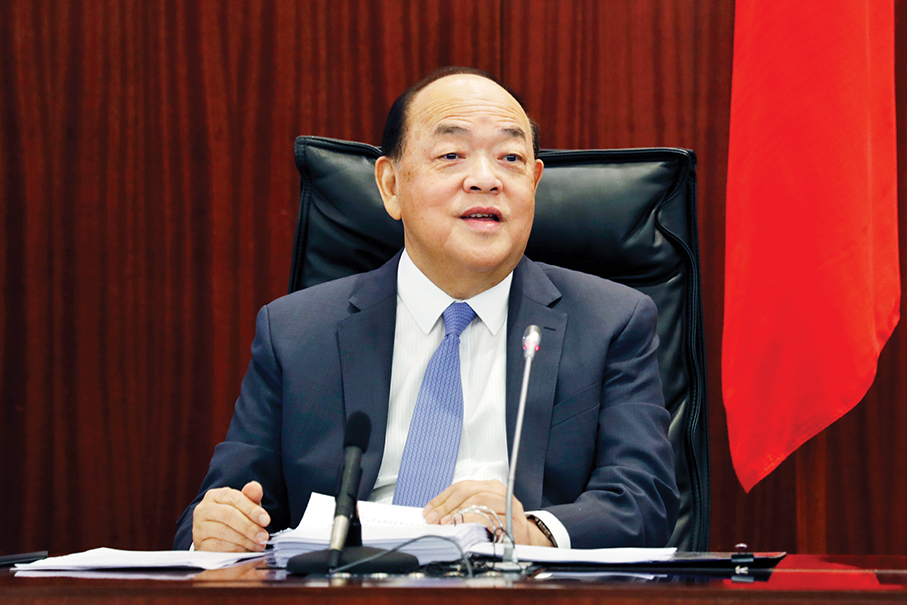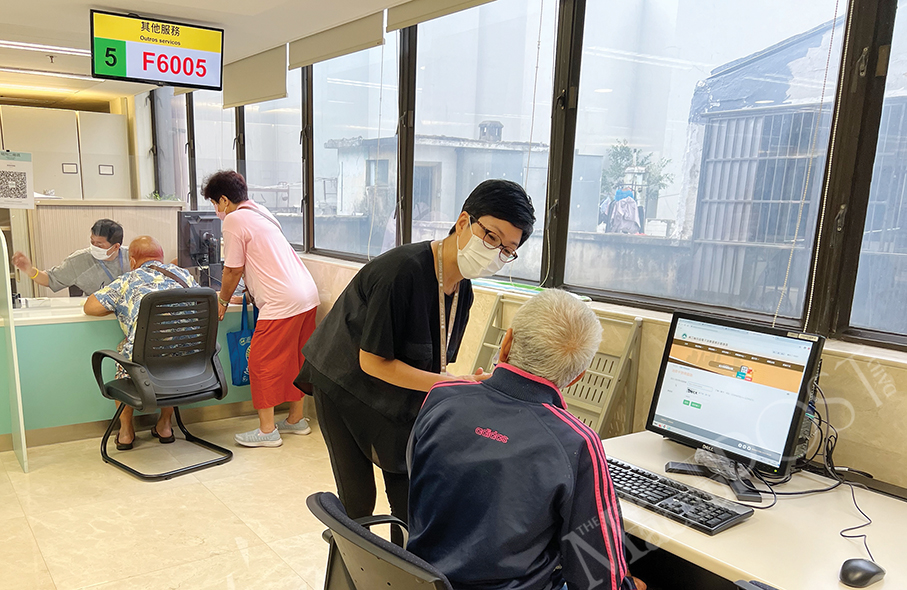Chief Executive Ho Iat Seng says that he expects the government to continue running a budget deficit next year despite the local economy’s recovery, but there would possibly not be a budget deficit in 2025 because of the expected continuation in the government’s increase in direct gaming tax revenue.
Ho said that the government’s essential expenditure currently amounts to at least 100 billion patacas every year, because of which only when Macau’s gross gaming revenue (GGR) reaches 230 billion patacas a year could the government run a balanced budget.
Macau’s gaming operators pay 35 percent of their gross gaming receipts as direct tax to the government.
Ho made the remarks during a Q&A session in the Legislative Assembly’s (AL) hemicycle on Friday.
Ho underlined that during the three-year COVID-19 pandemic from 2020 through 2022, the government recorded a large deficit every year, but the government did not cut its expenses on various essential public services for residents such as education and health during the three-year period, adding that the government only restricted its expenditure used for civil servants’ administrative work.
When the government presented its 2023 budget bill to the legislature in November last year, it expected a budget deficit of 35.6 billion patacas for this year. The local government discontinued its long-running dynamic zero-COVID approach in early December last year. The 2023 budget bill was passed by lawmakers in its second and final reading later that month. Macau’s economy began to recover early this year mainly driven by the rapid recovery of visitor numbers and the steady GGR recovery.
Ho noted on Friday that when drafting and presenting its 2023 budget bill last year, the government forecast this year’s GGR to reach 130 billion patacas. Ho said that based on the government’s current assessment of the gaming sector’s latest situation, Macau’s GGR could reach 170 billion to 180 billion patacas this year, in which case this year’s deficit would be smaller than the initially-projected level.
Govt’s revenues rely heavily on gaming tax
Ho said that the government will soon start to draft its 2024 budget bill, expecting to continue running a budget deficit next year. Ho said that the government would still incur a deficit even if Macau’s GGR would amount to 200 billion patacas a year.
Ho noted that the government has rolled out various tax deductions and exemptions for residents and businesses. Moreover, the chief executive said, tax revenues generated from real estate transactions have remained at low levels over recent years. Because of which, Ho acknowledged, the government’s revenues currently still rely heavily on direct gaming tax.
Ho also pointed out that the government’s annual essential expenditure currently amounts to at least 100 billion patacas per year.
Consequently, according to Ho, the government would still run a deficit of around 10 billion patacas with a 200-billion-pataca yearly GGR. Ho said that the government could only run a balanced budget with an annual GGR of 230 billion patacas.
Ho underlined that based on current projections, Macau’s GGR could reach around 200 billion patacas next year, in which case, he said, the government’s revenues would merely be “marginally” lower than its expected expenditure.
With GGR expected to continue rising, Ho said, the government could expect not to run a deficit in 2025.
Ho rules out population-wide financial support measures
Meanwhile, Ho underlined that financial support measures covering all or the majority of local residents would cost the government a large amount of money because of which for the time being the government was unable to roll out these types of measures such as consumption subsidies.
The government had rolled out several rounds of its electronic consumption benefit scheme since the COVID-19 pandemic started to affect Macau in early 2020. The scheme covered all local residents.
Last year’s electronic consumption benefit scheme consisted of an 8,000-pataca consumption subsidy. In addition, the government rolled out another 8,000-pataca subsidy officially known as Living Subsidy late last year.
Ho stressed that the government should no longer roll out financial support measures covering all or the majority of local residents. Instead, he said, the government should only continue with its various support measures targeting those in need.
Public servants’ salaries should rise
Meanwhile, Ho acknowledged that public servants’ salaries have not been raised for a few years, adding he believed that their salaries should be increased.
Ho said that two months ago the government told its committee tasked with reviewing public servants’ salaries to study the possibility of raising their salaries. Ho said that the level of a possible increase in public servants’ salaries is not decided by him or his policy secretaries. Instead, he said, the matter is statutorily decided by the committee which comprises representatives of public servants, those from community associations, and officials from the Statistics and Census Bureau (DSEC).
According to Ho, a rise in public servants’ salaries in the government’s ongoing preparation work on drafting the 2024 budget bill is possible. Ho said that if the committee would propose a salary rise, the government would propose an increase in public servants’ salaries in its 2024 budget bill accordingly.
Any salary increase for public servants must be passed by the Legislative Assembly (AL).

Chief Executive Ho Iat Seng answers questions from lawmakers during Friday’s Q&A session in the Legislative Assembly’s (AL) hemicycle. – Photo: GCS










